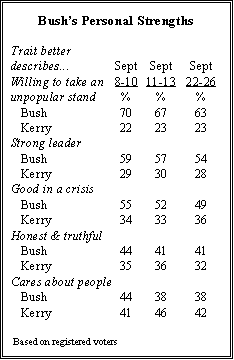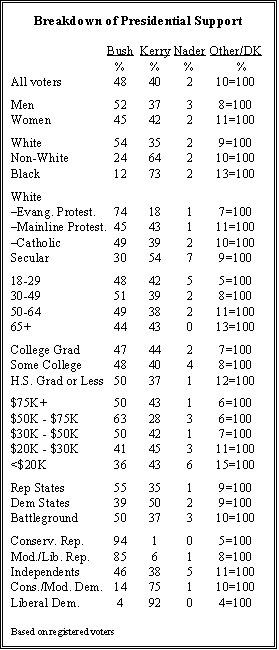Summary of Findings
 George W. Bush has reopened a significant lead over challenger John Kerry over the past week, even as voters express less confidence in the president on Iraq and he continues to trail Kerry on the economy. Two successive nationwide surveys of nearly 1,000 registered voters each show Bush’s margin over Kerry growing steadily since mid-September (Sept. 11-14), when the two men were tied at 6%-46%. Bush’s slight 45%-42% advantage in the Sept. 17-21 survey has grown to 48%-40% in the current poll (Sept. 22-26).
George W. Bush has reopened a significant lead over challenger John Kerry over the past week, even as voters express less confidence in the president on Iraq and he continues to trail Kerry on the economy. Two successive nationwide surveys of nearly 1,000 registered voters each show Bush’s margin over Kerry growing steadily since mid-September (Sept. 11-14), when the two men were tied at 6%-46%. Bush’s slight 45%-42% advantage in the Sept. 17-21 survey has grown to 48%-40% in the current poll (Sept. 22-26).
 The poll finds that Bush’s gains in support are being driven more by perceptions of Kerry’s weakness especially on leadership and other personal traits than by improved opinions of Bush. Fewer voters favor Bush over Kerry on handling Iraq than did so earlier this month (46% now, 52% Sept. 11-13). But Kerry’s rating in the head-to-head evaluation on Iraq is no higher (38% now, 40% then). The Democratic challenger continues to inspire more confidence than Bush with regard to improving the economy, which 60% of Americans believe is in only fair or poor shape. But even here, the percentage favoring Kerry has not increased since the Sept. 11-13 survey (46% now, 47% then).
The poll finds that Bush’s gains in support are being driven more by perceptions of Kerry’s weakness especially on leadership and other personal traits than by improved opinions of Bush. Fewer voters favor Bush over Kerry on handling Iraq than did so earlier this month (46% now, 52% Sept. 11-13). But Kerry’s rating in the head-to-head evaluation on Iraq is no higher (38% now, 40% then). The Democratic challenger continues to inspire more confidence than Bush with regard to improving the economy, which 60% of Americans believe is in only fair or poor shape. But even here, the percentage favoring Kerry has not increased since the Sept. 11-13 survey (46% now, 47% then).
Despite Bush’s lukewarm evaluations on the issues, he maintains a significant advantage on most personal traits. Kerry has slipped slightly on some key personal assessments, including honesty and empathy. Overall, 32% of voters say the phrase “honest and truthful” better describes Kerry than Bush, down from 36% a few weeks ago (Sept. 11-13). Bush’s rating in that period is unchanged at 41%.
 A similar pattern is evident in comparative evaluations of the candidates’ empathy: 42% say the phrase “cares about people like me” better describes Kerry, compared with 46% earlier this month. Bush’s rating on this measure also has not changed (38%).
A similar pattern is evident in comparative evaluations of the candidates’ empathy: 42% say the phrase “cares about people like me” better describes Kerry, compared with 46% earlier this month. Bush’s rating on this measure also has not changed (38%).
Kerry’s image weakness is most evident on questions of leadership and his willingness to take on unpopular positions. Just 28% say the phrase “strong leader” better fits Kerry, virtually unchanged from earlier this month, while 54% say it applies to Bush. And 23% believe Kerry takes on unpopular stances, compared with 63% who say that about Bush. In both cases, Bush’s ratings are down slightly from earlier this month, but Kerry has gained no ground.
Bush Improving Among Women, Young People
In the horse race, President Bush currently runs about even with Kerry among women (45%-42%), and leads among people with a high school education (50%-37%) and those under age 30 (48%-42%). Opinion in these groups has been unstable in recent weeks, but all three leaned toward Kerry in August, following the Democratic convention in Boston.
The shift among women, a group that Al Gore carried by 11 points in 2000, is particularly notable. In August, Kerry led among women by 10 points (52%-42%) while trailing among men by about the same margin (42%-50%). Bush has drawn virtually even with Kerry among women, while expanding his lead among men to 52%-37%.
The horse race among young people has seesawed dramatically since August, when Kerry held an 18-point lead (53%-35%). This month, Bush and Kerry each have held sizable leads among those younger than 30, underscoring the volatility of voters in this age group. In 2000, young voters backed Gore by a slight margin (48%-46%), according to VNS exit polls.
 Kerry’s support also has declined among people with less formal education. In August, Kerry led narrowly among those with no more than a high school education, and opinion has fluctuated since then. Bush’s current advantage is 13 points (50%-37%). Gore won this group in 2000 by (50%-47%).
Kerry’s support also has declined among people with less formal education. In August, Kerry led narrowly among those with no more than a high school education, and opinion has fluctuated since then. Bush’s current advantage is 13 points (50%-37%). Gore won this group in 2000 by (50%-47%).
Bush also has a commanding lead (74% to 18%) among white evangelical Protestants, similar to his advantage throughout the campaign season. More ominously for Kerry, the president built an edge among white Catholics in early September that has held throughout the month (now 49%-39%). In 2000, Bush beat Gore among this important swing constituency white Catholics constitute about one of every five voters but only by seven points.
Kerry continues to hold a big lead among African-Americans and among secular individuals, but in both cases his advantage is narrower than it was last month. Among blacks, he leads the president by 73% to 12%, compared with 83%-6% in August and 83% to 5% last week.


